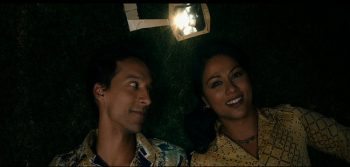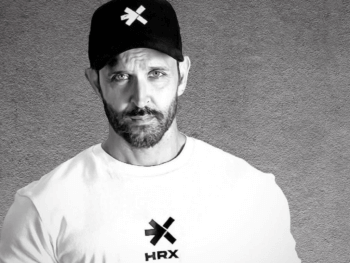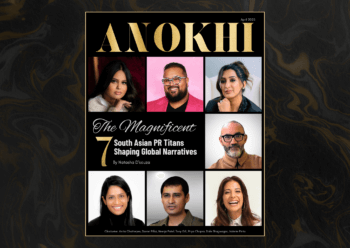
Karen David and Danny Pudi find love and laughs in delightful immigrant tale The Tiger Hunter.
It’s 1979, and young Indian engineer Sami Malik (Danny Pudi) is on the cusp of having it all. With a big-time job lined up in Chicago, he’ll finally be able to win over his childhood crush Ruby (Karen David) and live up to the reputation of his father — a man revered in his village as “the tiger hunter.”
Little does Sami know, his path to the American Dream will be a bit bumpier than it looks. He arrives stateside only to find that the company has decided to cut back, and the lucrative position he was promised is off the table. What’s left on the table? A low-paying job as a draftsman — literally working in the building’s basement.

Photo Credit: Sneaky Sneaky Films
Despite finding a rapport with one of his fellow employees (Napoleon Dynamite's Jon Heder), the office is pretty much a nightmare, but if nothing else, it allows him a reprieve from the comically tiny co-op he’s forced to share with a half-dozen similarly disenfranchised immigrants, including vastly overeducated parking attendant Babu (Schitt's Creek's Rizwan Manji). Seemingly, things couldn’t get any worse . . . so, naturally, that’s when Ruby calls to let him know that she and her father, the General (Community's Iqbal Theba), will be coming to America to find her a husband.
Determined not to miss his shot, Sami and his new cohorts embark on what can only be described as a hare-brained campaign to make it seem as though he’s wildly successful. Corporate hustling, prison and psychedelic drugs ensue.
At once a charmingly quirky romantic comedy and a savvy, heartfelt exploration of the immigrant experience, director Lena Khan shows a deft touch in her debut feature, balancing laughs and pathos, and sidestepping clichés to craft a film that, for all its hijinks, feels grounded in something very real and relatable. It took home numerous honours at this year's Los Angeles Asian Pacific Film Festival.
“I think it always comes down to character,” Khan explains of crafting the film's central love story. “The key is: what does love mean to those characters? For some, it's that goofy grin, and breakfast in bed, and all of that. For some, it's just being there for the other person — actually being in their life, even if they aren't as good as they think they need to be yet. That second part is what it meant for Sami and Ruby.”

Photo Credit: Sneak Sneaky Films
Just as crucial are the two disarming lead performances at the centre of the story. For Pudi in particular, it’s a chance to show fans of a certain cultishly adored NBC sitcom a very different side of himself.
“Casting sort of fell into our lap, in a way I didn't at first imagine,” Khan admits. “Most of it started with Danny, and I give credit to that to our amazing casting director, Emily Schweber. Having been so familiar with him in Community, I couldn't imagine him in such a soulful (and not awkward) role. But I met with him and I could tell he would bring something to it that other actors wouldn't. There is no Sami without Danny. He can just sit and look at an object in his hand with soul, and his comedic timing is amazing. His charisma oozes from the screen.”
According to Pudi, that’s not the only thing that was oozing.
“Seventies-era clothing does not breathe well. Shooting this film in August in L.A. and in India proved that. But the odors we emitted brought us closer together. I hope.”
Though perhaps not as drastic a departure, playing the Indian-born Ruby represented something of a new challenge for David, who grew up in Canada.

Photo Credit: Sneaky Sneaky Films
“Playing a girl from a village in India, accent and all — there's a different cultural energy about playing a character from that background, and that excited me and scared me (in a good way)! I had a huge responsibility to play the authenticity of that mindset and of the times it was set in, the late ’70s. It was about finding the right balance for me and knowing how to play a young woman in those times, and what was expected of her. Somewhere in that mix, I wanted to add a quiet strength to Ruby, and an endearing sense of wisdom beyond her years to round her character out. Most of all, I wanted her to be this ray of sunshine in Sami's life. Hopefully I was able to do that.”
Indeed, as far as her director was concerned, she was the only one who could. When David’s commitment to ABC fairy tale musical Galavant came into conflict with the film’s shooting schedule, rather than recast, Khan opted to delay production for months to make sure she got her Ruby.
“Literally no other actress I saw worked. She brought to the character what wasn't written on the page, but what the movie needed — a classic, sweet, girl next door character from the ‘70s who was a girl of her age and period but also had spunk and fire and budding independence,” Khan explains. “I'm so glad we fought for her. She is also gorgeous. She can wield a sword like nobody's business and has an amazing voice. I was tempted to make Ruby sing.”
Beyond the singular charm both performers bring to all of their projects, in this case, it no doubt helped that they felt a deep personal connection to the material.

Photo Credit: John Tucci
“My family and I immigrated from India to the Western world, in the hopes of better opportunities for my older sister and I — that was of prime importance to my parents,” David explains. “The courage they had to leave everything behind: their assets family, friends and their stable jobs, to venture out into the unknown, is something that I always remember every day of my life and am so grateful to them for . . . On top of that, just like Sami's father, my great uncle was also a tiger hunter, and was loved and revered in his village for protecting the local folks from a man eating tiger. The coincidences were telling me that this was all serendipitous and meant to be.”
“I loved the script right away and immediately connected to it,” adds Pudi. “I'm a child of immigrants. My father, like Sami, emigrated from India to Chicago in the 1970s. And my mother immigrated to Chicago from Poland in the 1970s. Both of them left their families and everything familiar in hopes of bettering their lives. I owe them, and this project gave me a chance to tell their stories.”
Indeed, everyone involved has expressed pride that the film was shining the spotlight on an underrepresented group in North America, with plenty of Indian-American talent in front of and behind the camera. That said, the notions of striving for love and success and finding yourself through adversity aren’t unique to the immigrant experience. As David notes: “What's so wonderful about The Tiger Hunter, is that many people can relate to this heartfelt and courageous immigrant story — it's universal.”

Photo Credit: K.C. Nekro
It’s a sentiment her director echoes:
“It depends on who is seeing it. For some people, I'm happy for them to simply get sucked into a story of ambition and love and funny corporate America where they forgot for a moment the ethnicity of the main characters, and love them just the same. For some, I'd love for them to reflect a bit on what it really means to be successful. For others, I'm excited if they reflect a bit on what it means to be an immigrant chasing an ideal here.?”
For more information on the film, visit the tigerhunter.com.
Main image photo credit: Sneaky Sneaky Films
Matthew Currie
Author
A long-standing entertainment journalist, Currie is a graduate of the Professional Writing program at Toronto’s York University. He has spent the past number of years working as a freelancer for ANOKHI and for diverse publications such as Sharp, TV Week, CAA’s Westworld and BC Business. Currie ...














































































































